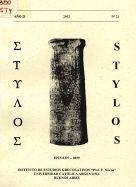Por favor, use este identificador para citar o enlazar este ítem:
https://repositorio.uca.edu.ar/handle/123456789/4933| Título: | La crítica a los dioses griegos como argumento apologético en la Legatio de Atenágoras | Autor: | Pérez, Laura | Palabras clave: | HISTORIA DE GRECIA; LITERATURA GRIEGA; APOLOGETICA; CRISTIANISMO; ATEISMO; DIOSES; MITOLOGIA GRIEGA | Fecha de publicación: | 2012 | Editorial: | Universidad Católica Argentina. Facultad de Filosofía y Letras. Instituto de estudios grecolatinos "Prof. F. Nóvoa" | Cita: | Pérez, Laura. “La crítica a los dioses griegos como argumento apologético en la Legatio de Atenágoras [en línea]. Stylos, 21 (2012). Disponible en: https://repositorio.uca.edu.ar/handle/123456789/4933 | Resumen: | Resumen: Atenágoras dedica la mayor parte de su escrito apologético Legatio sive Supplicatio pro Christianis a la defensa frente a la acusación de ateísmo que recaía sobre los cristianos en el siglo II. En este marco, la principal estrategia de auto-justificación consiste en una aguda refutación de los dioses y mitos que conformaban la religión tradicional y de los poetas que narraban esos mitos. El apologista intenta probar así que los verdaderos ateos son los griegos, pues creen en dioses falsos e inverosímiles. Sus ataques tienen precedentes en la crítica filosófica a la poesía religiosa que ya se había desarrollado desde el siglo VI a.C. en autores como Jenófanes, Heráclito y Platón. No obstante, en el contexto de polémica entre diversos sistemas culturales que pretenden imponerse y ganar aceptación, estas invectivas adquieren otra dimensión y alcanzan nuevas conclusiones, mucho más corrosivas. Athenagoras dedicates the major part of his apologetic work Legatio sive Supplicatio pro Christianis to the defence against the accusation of atheism that fell over Christians in the second century. In this frame, the principal strategy of self-justification consists in a sharp refutation of the gods and myths that conformed traditional religion and of the poets who narrated those myths. The apologist attempts to prove by these means that the true atheists are the Greeks, given that they believe in false and incredible gods. His attacks have precedents in philosophic critique to religious poetry that had developed since the sixth century BC in authors like Xenophanes, Heraclitus and Plato. Nevertheless, in the context of polemic between diverse cultural systems which aim to impose themselves and to earn acceptation, these invectives acquire another dimension and reach new conclusions, much more corrosive. |
URI: | https://repositorio.uca.edu.ar/handle/123456789/4933 | ISSN: | 0327-8859 | Disciplina: | LITERATURA | Derechos: | Acceso Abierto | Fuente: | Stylos, nº 21, 2012 |
| Aparece en las colecciones: | STY - 2012 nro. 21 |
Ficheros en este ítem:
| Fichero | Descripción | Tamaño | Formato | |
|---|---|---|---|---|
| critica-dioses-griegos-argumento-legatio.pdf | 171,18 kB | Adobe PDF |  Visualizar/Abrir |
Visualizaciones de página(s)
3.181
comprobado en 27-abr-2024
Descarga(s)
1.389
comprobado en 27-abr-2024
Google ScholarTM
Ver en Google Scholar
Este ítem está sujeto a una Licencia Creative Commons

